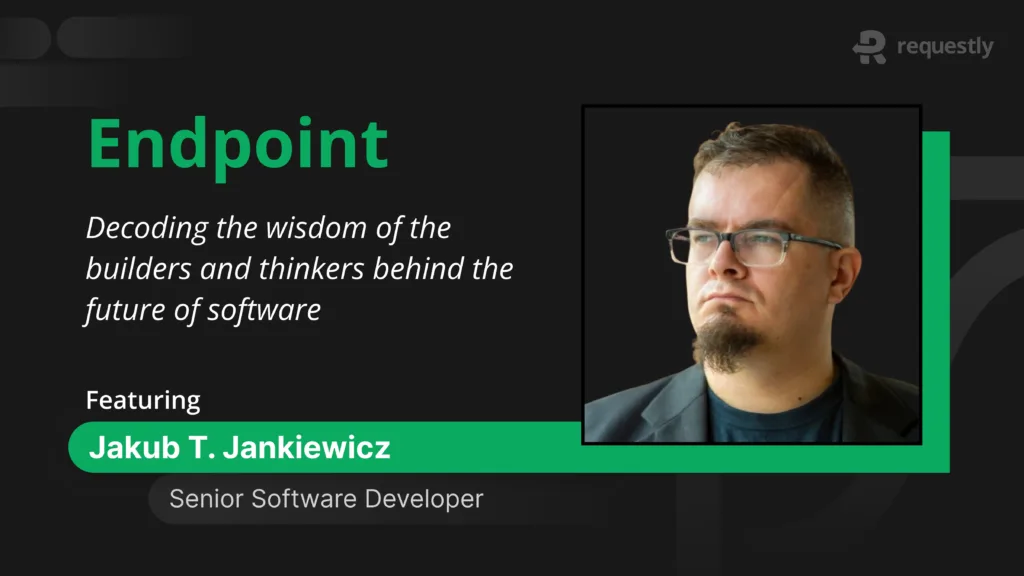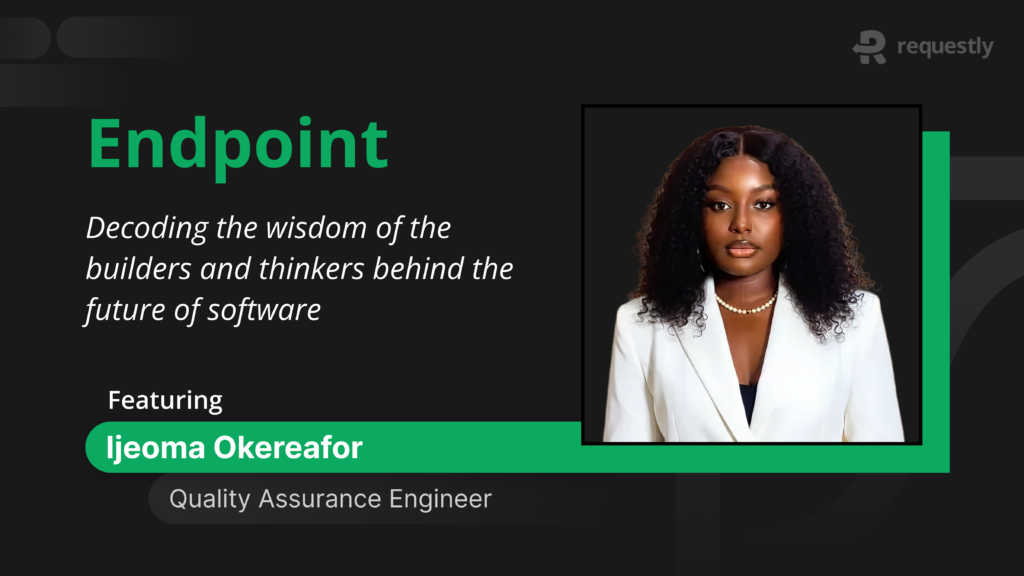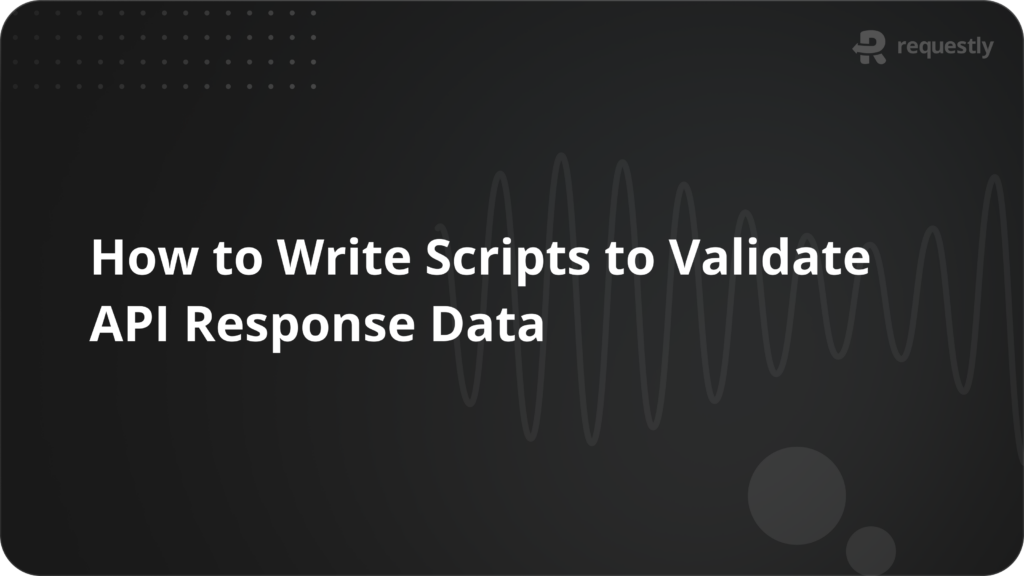Endpoint ft. Jakub T. Jankiewicz: Open Source, AI & SDLC

Your lightweight Client for API debugging
No Login Required
Requestly is a web proxy that requires a desktop and desktop browser.
Enter your email below to receive the download link. Give it a try next time you’re on your PC!










In the world of technology, some leaders don’t just follow trends—they define them. They are the builders and thinkers, grounded in real-world experience, whose insights push the industry forward. To celebrate their work and bring their hard-won wisdom to the community, we’re proud to introduce Endpoint—a series by Requestly spotlighting the leaders shaping the future of software.
As a seasoned Senior Front-End Developer with extensive experience, Jakub T. Jankiewicz has a rich history of shipping code for major projects. But it’s his deep-seated passion for the open-source community, his work as a blog writer and mentor, and his clear-eyed view on technology that make his perspective so compelling.
We spoke with Jakub to get his take on the topics that matter most to developers today: from front-end and back-end workflows to his pragmatic evaluation of AI and his invaluable advice for anyone looking to contribute to open-source.
A Q&A with Jakub T. Jankiewicz
From your experience, what strategies work best for aligning front-end and back-end workflows?
If you want to work in parallel, the most important thing is clear communication. You need to decide upfront on the shape of the API before you start implementation. This way, front-end and back-end can be created independently.
Where do you think AI can make the biggest impact in streamlining development cycles
The biggest impact can be in bootstrapping new projects (creating prototypes or MVPs), helping with testing, and DevOps tasks (like creating config files). It might also help new developers understand bigger codebases.
AI is a hype right now, but it will take a lot of time before AI is fully integrated into the workflows of most software development companies.
The fact is that we hear a lot about AI being the future, but this is only because the voice of proponents is loudest. There are a lot of skeptics around, you just don’t hear them as much.
How do you evaluate an open-source tool before incorporating it into your development workflow?
If it’s a project on GitHub, where most OSS projects live, I check open issues to see if they have replies and if there are open PRs hanging. The most important thing is checking if issues get replies. I also check when the last commit was. This helps in knowing if the project is maintained or not.
The number of stars and the last commit aren’t that important. If the project is stable and doesn’t have unanswered issues, it means the project is healthy.
How do you see the role of open-source tools evolving in an AI-driven development landscape?
A lot of new tools that appear are AI-driven, and there will be more and more of them. But I think existing OSS tools won’t change much. I’m part of the Open Source Maintainers community on GitHub, and there’s hesitation about allowing AI usage during contributions.
What’s one piece of advice you’d give to developers who are just starting out in open-source contributions?
You don’t need to contribute with code; there are other ways of contributing, like improving documentation, answering questions, or spreading information about the project.
First, get familiar with the project, read the documentation, and most importantly, use the project. Don’t search for random projects and start fixing bugs. You should contribute to something you like using. Most meaningful contributions people make are fixing a bug or adding a feature they want for themselves in something they use.
What’s one recent shift or trend in the tech space you’re most excited about?
I’m not sure if this is a trend, but my personal shift was starting to use AI to write shell scripts and configuration files for various tools. I don’t use AI that much in development because I get mixed results. But using AI for automation is very fulfilling.
Who’s a developer or tech leader you follow and admire, and what makes their work so impactful to you?
I think I’ll mention Kyle Simpson (aka getify). I admire him mostly because of his impact on the JavaScript community and his dedication to teaching.
What was your biggest takeaway from Jakub’s insights? Share your thoughts and join the conversation on LinkedIn!
Join us in celebrating Jakub T. Jankiewicz and the incredible work of all the developers, builders, and product leaders who are pushing the boundaries of technology. Stay tuned as we continue to spotlight more leaders in our Endpoint series.
Contents
- A Q&A with Jakub T. Jankiewicz
- From your experience, what strategies work best for aligning front-end and back-end workflows?
- Where do you think AI can make the biggest impact in streamlining development cycles
- How do you evaluate an open-source tool before incorporating it into your development workflow?
- How do you see the role of open-source tools evolving in an AI-driven development landscape?
- What’s one piece of advice you’d give to developers who are just starting out in open-source contributions?
- What’s one recent shift or trend in the tech space you’re most excited about?
- Who’s a developer or tech leader you follow and admire, and what makes their work so impactful to you?
Subscribe for latest updates
Share this article
Related posts
Get started today
Requestly is a web proxy that requires a desktop and desktop browser.
Enter your email below to receive the download link. Give it a try next time you’re on your PC!



















